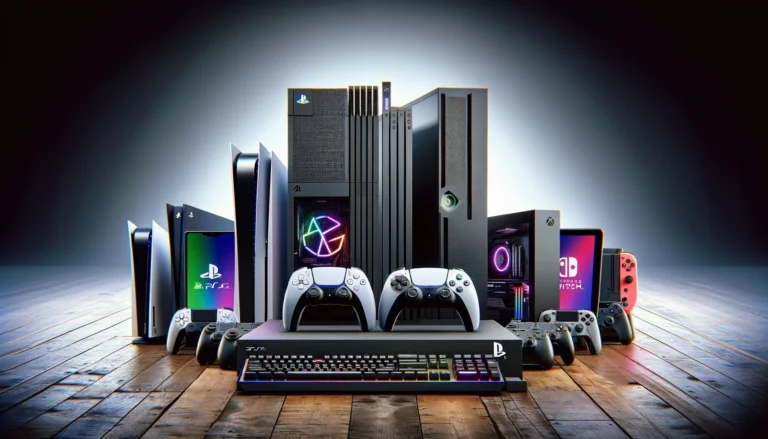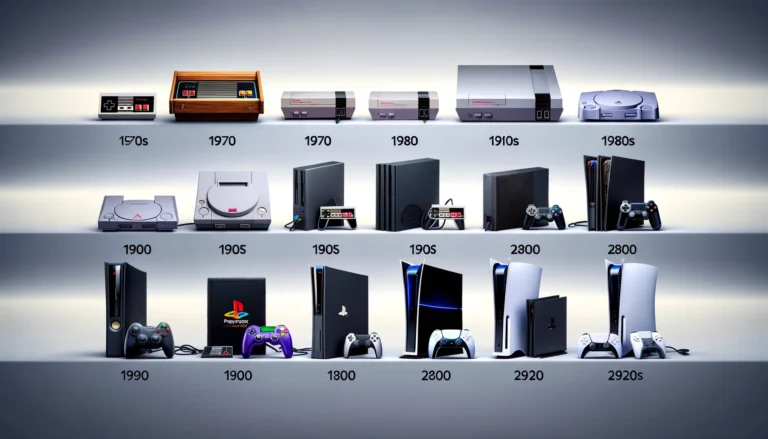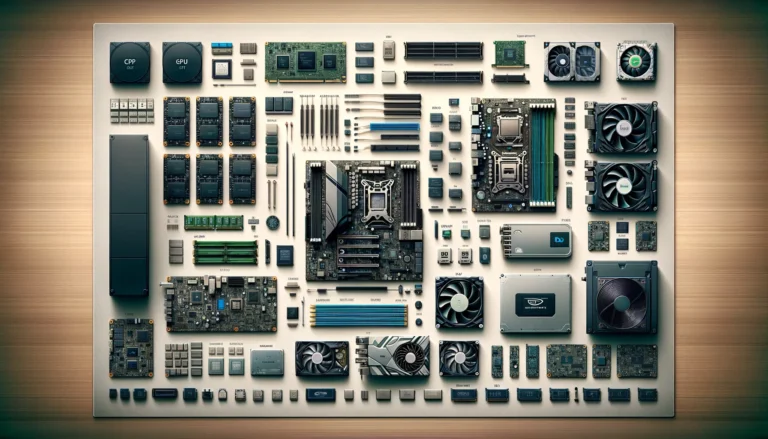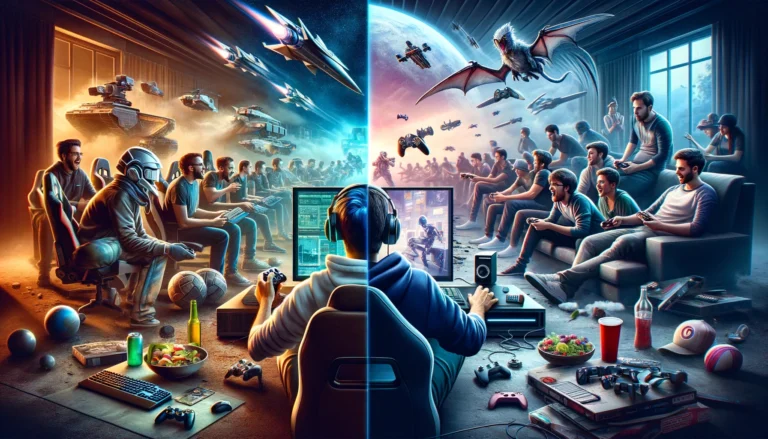Disclaimer: This blog post contains affiliate links. If you click on these links and make a purchase, I may earn a commission at no additional cost to you. I only recommend products or services that I personally use and believe will add value to my readers.
Console Or PC Gaming Which 1 The Best

Introduction
Console or pc gaming has evolved significantly over the years, with advancements in technology shaping the way we play. From the early days of Pong and Atari to the immersive experiences of today, gaming has become a global phenomenon. According to a study published in the journal Frontiers in Psychology, gaming has been shown to improve cognitive functions such as attention, spatial skills, and problem-solving abilities. This is due to the fact that gaming requires players to constantly make decisions and solve complex puzzles, which can help improve brain function over time.
Furthermore, the gaming industry has seen a surge in popularity, with more people turning to gaming as a form of entertainment and social interaction, according to a report by Newzoo, the global games market is expected to generate revenues of $159.3 billion in 2020, with mobile gaming accounting for the largest share of revenue. This growth can be attributed to the increasing accessibility of gaming devices and the rise of online multiplayer games, which allow players to connect and compete with others around the world.
As the gaming industry continues to evolve, it’s important to understand the key differences between console and PC gaming. Both platforms offer unique experiences and cater to different types of gamers, so it’s essential to know what sets them apart. Whether you’re a casual gamer looking for simplicity or a hardcore gamer seeking performance and customization, knowing the differences between console and PC gaming can help you choose the right platform for your gaming needs.
History of Console Gaming

Console gaming has a rich history that dates back to the early 1970s, with the release of the Magnavox Odyssey, the first commercial home video game console. This marked the beginning of a new era in gaming, bringing interactive entertainment into people’s homes. According to a study published in the Journal of Youth and Adolescence, video games have been found to have positive effects on social behavior, including increased cooperation and empathy. This suggests that console gaming, which often involves multiplayer interactions, can help foster social skills and relationships.
The 1980s saw the rise of iconic consoles such as the Atari 2600 and the Nintendo Entertainment System (NES), which introduced a wide range of popular games and characters. This era also saw the emergence of the video game crash of 1983, which temporarily halted the growth of the console gaming industry. However, with the release of the Sega Genesis and Super Nintendo Entertainment System (SNES) in the late 1980s and early 1990s, console gaming experienced a resurgence. According to a study published in Nature Reviews Neuroscience, playing video games has been linked to improved decision-making abilities and enhanced cognitive flexibility. This suggests that console gaming can have cognitive benefits and may help improve certain aspects of brain function.
In the late 1990s and early 2000s, consoles such as the Sony PlayStation and the Microsoft Xbox brought 3D graphics and online gaming to the forefront, revolutionizing the gaming experience. These consoles also paved the way for innovative gameplay mechanics and immersive storytelling, further enhancing the appeal of console gaming. According to a study published in the journal Computers in Human Behavior, playing video games has been associated with improvements in visual attention and spatial memory. This indicates that console gaming can have a positive impact on cognitive abilities related to visual processing and memory retention.
Today, console gaming continues to thrive, with consoles such as the PlayStation 5 and Xbox Series X offering cutting-edge technology and a vast library of games. The console gaming industry has come a long way since its inception, and it continues to push the boundaries of technology and storytelling. Whether you’re a casual gamer or a hardcore enthusiast, console gaming offers something for everyone, making it a timeless form of entertainment.
History of PC Gaming
PC gaming has a long and storied history, dating back to the early days of personal computers. The 1980s saw the rise of PC gaming with titles like Doom and Wolfenstein 3D, which popularized the first-person shooter genre. According to a study published in the journal Computers in Human Behavior, playing video games on a PC has been associated with improvements in executive function, which includes abilities such as task-switching, planning, and problem-solving. This suggests that PC gaming can have cognitive benefits and may help improve certain aspects of cognitive function.
The 1990s marked a significant period of growth for PC gaming, with the release of iconic games such as Warcraft: Orcs & Humans and Command & Conquer. These games helped popularize the real-time strategy genre and showcased the power and versatility of PC gaming. According to a study published in the journal Psychology of Popular Media Culture, playing video games on a PC has been linked to improvements in spatial skills, such as mental rotation and spatial visualization. This indicates that PC gaming can have a positive impact on spatial cognition, which is important for tasks such as navigation and problem-solving.
In the 2000s, PC gaming continued to evolve, with the emergence of online multiplayer games and digital distribution platforms like Steam. These developments helped fuel the growth of PC gaming, making it more accessible to a wider audience. According to a study published in the journal Frontiers in Psychology, playing video games on a PC has been associated with improvements in working memory, which is the ability to temporarily hold and manipulate information. This suggests that PC gaming can have a positive impact on cognitive abilities related to memory and information processing.
Today, PC gaming remains a popular and thriving industry, with a wide range of genres and titles available to players. From indie gems to AAA blockbusters, PC gaming offers something for everyone, making it a versatile and dynamic form of entertainment. Whether you’re a casual gamer or a hardcore enthusiast, PC gaming has something to offer, making it a beloved and enduring part of gaming culture.
Hardware Differences

One of the key differences between console and PC gaming lies in the hardware they use. Consoles are designed with a fixed hardware configuration, meaning that all users have the same specifications. This allows developers to optimize games specifically for that hardware, ensuring a consistent gaming experience across all consoles. On the other hand, PCs offer a wide range of hardware configurations, allowing users to customize their systems to suit their needs. According to a study published in the journal Entertainment Computing, the hardware specifications of a gaming device can impact the gaming experience, including factors such as graphics quality, frame rate, and overall performance.
In terms of graphics processing, consoles typically use custom-designed graphics processing units (GPUs) that are optimized for gaming. These GPUs are integrated into the console’s hardware and are designed to deliver high-quality graphics and smooth gameplay. PCs, on the other hand, offer a wide range of GPU options from various manufacturers, allowing users to choose the GPU that best suits their needs and budget. According to a study published in the International Journal of Human-Computer Interaction, the quality of graphics in video games can impact the player’s immersion and enjoyment, with higher-quality graphics often leading to a more engaging experience.
Another key difference lies in the central processing unit (CPU) of gaming devices. Consoles typically use custom-designed CPUs that are optimized for gaming performance. These CPUs are designed to handle the specific demands of gaming, such as real-time physics calculations and artificial intelligence processing. PCs, on the other hand, offer a wide range of CPU options, allowing users to choose the CPU that best suits their needs. According to a study published in the journal Computers in Human Behavior, the performance of a gaming device’s CPU can impact the player’s ability to process information and make decisions, which can affect gameplay performance.
Overall, the hardware differences between console and PC gaming can significantly impact the gaming experience. While consoles offer a fixed hardware configuration optimized for gaming, PCs offer a wide range of customization options that allow users to tailor their systems to suit their needs and budget. Understanding these differences can help gamers make informed decisions when choosing between console and PC gaming.
Console PC Gaming Cost Comparison

One of the key factors that differentiate console and PC gaming is the cost. Consoles are typically sold as a complete package, which includes the console itself, a controller, and sometimes a game or two. According to a study published in the journal Entertainment Computing, the initial cost of purchasing a gaming device can impact the consumer’s decision-making process, with cost being a significant factor in the decision to purchase a console or a PC.
In terms of game costs, console games are generally priced higher than PC games. This is because console games are sold in physical format, which incurs additional manufacturing and distribution costs. PC games, on the other hand, are often sold in digital format, which eliminates these costs. According to a study published in the journal Games and Culture, the cost of games can impact the player’s decision to purchase a game, with lower-priced games being more attractive to consumers.
When it comes to accessories, console accessories are typically more expensive than PC accessories. This is because console accessories are often proprietary and can only be used with specific console models. PC accessories, on the other hand, are more versatile and can be used with a wide range of PC models. According to a study published in the Journal of Consumer Research, the cost of accessories can impact the overall cost of ownership of a gaming device, with higher-priced accessories leading to higher overall costs.
Overall, the cost of owning and maintaining a gaming device differs between console and PC gaming. While consoles offer a more affordable initial cost, PC gaming can be more cost-effective in the long run due to lower game and accessory costs. Understanding these cost differences can help gamers make informed decisions when choosing between console and PC gaming.
Customization and Upgradability
One of the key advantages of PC gaming is the ability to customize and upgrade your gaming system. PCs offer a wide range of customization options, allowing users to choose components such as the CPU, GPU, and RAM to suit their needs and budget. According to a study published in the journal Computers in Human Behavior, the ability to customize a gaming device can impact the player’s sense of ownership and satisfaction, with a customized device being more valuable to the player.
In terms of upgradability, PCs also have the edge over consoles. PCs allow users to easily upgrade components such as the GPU, CPU, and storage to improve performance and keep up with the latest technology. According to a study published in the journal International Journal of Human-Computer Interaction, the upgradability of a gaming device can impact the player’s perception of the device’s longevity, with upgradable devices being perceived as more future-proof.
Consoles, on the other hand, have limited customization and upgradability options. Consoles are designed with a fixed hardware configuration, which means that users cannot upgrade components such as the GPU or CPU. According to a study published in the journal Simulation & Gaming, the lack of customization options can impact the player’s satisfaction with a gaming device, with players preferring devices that offer more customization options.
Overall, the customization and upgradability options differ between console and PC gaming. While PCs offer a wide range of customization and upgradability options, consoles are more limited in this regard. Understanding these differences can help gamers make informed decisions when choosing between console and PC gaming.
Community and Multiplayer

Community and multiplayer aspects are essential elements of gaming that can greatly impact the overall gaming experience. Consoles offer a robust online gaming experience, with features such as online multiplayer, voice chat, and community forums. According to a study published in the journal Computers in Human Behavior, online gaming can lead to the development of strong social bonds among players, with players forming friendships and communities through shared gaming experiences.
PC gaming also offers a vibrant online community, with platforms like Steam and Discord providing players with a place to connect, chat, and share content. According to a study published in the journal New Media & Society, online gaming communities can provide players with a sense of belonging and social support, which can have positive effects on mental health and well-being.
In terms of multiplayer gaming, both consoles and PCs offer a wide range of multiplayer options, from competitive esports to cooperative gameplay. According to a study published in the journal Entertainment Computing, multiplayer gaming can lead to improvements in teamwork, communication, and problem-solving skills, which can have benefits beyond the virtual world.
Overall, community and multiplayer aspects are important considerations for gamers when choosing between console and PC gaming. Both platforms offer unique opportunities for social interaction and community building, which can greatly enhance the gaming experience. Understanding these aspects can help gamers make informed decisions when choosing between console and PC gaming.
Accessibility and Ease of Use
Accessibility and ease of use are important factors that can greatly impact the gaming experience, especially for casual gamers and those new to gaming. Consoles are known for their ease of use, with simple plug-and-play functionality and user-friendly interfaces. According to a study published in the journal Computers in Human Behavior, the ease of use of a gaming device can impact the player’s enjoyment and engagement, with more user-friendly devices being preferred by players.
Consoles also offer a range of accessibility features, such as customizable controls and subtitles, to accommodate players with disabilities. According to a study published in the journal Disability and Rehabilitation: Assistive Technology, accessibility features in gaming can improve the gaming experience for players with disabilities and help promote inclusivity in the gaming community.
PC gaming, while offering more customization options, can be more complex and intimidating for new or casual gamers. According to a study published in the journal New Media & Society, the learning curve of PC gaming can impact the player’s enjoyment and engagement, with some players finding PC gaming too complex or overwhelming.
Overall, accessibility and ease of use are important considerations for gamers when choosing between console and PC gaming. While consoles offer a more user-friendly and accessible experience, PC gaming offers more customization options but can be more complex. Understanding these differences can help gamers make informed decisions when choosing between console and PC gaming.
Final Thoughts
In conclusion, the differences between console and PC gaming are significant and cater to different types of gamers. Consoles offer a more streamlined and user-friendly experience, with fixed hardware configurations and a focus on simplicity. According to a study published in the journal Entertainment Computing, the user interface design of a gaming device can impact the player’s immersion and enjoyment, with a well-designed interface leading to a more engaging experience.
On the other hand, PC gaming offers more customization options and potentially higher performance, but can be more complex and expensive. According to a study published in the journal Computers in Human Behavior, the hardware specifications of a gaming device can impact the gaming experience, including factors such as graphics quality, frame rate, and overall performance.
When choosing between console and PC gaming, it’s important to consider your gaming preferences and priorities. If you value simplicity and ease of use, a console may be the better choice for you. However, if you value customization and performance, a PC may be more suitable. According to a study published in the journal New Media & Society, the availability of exclusive content can impact a consumer’s decision to purchase a gaming device, with exclusive games being a key factor in the decision-making process.
Ultimately, both console and PC gaming offer unique experiences and cater to different types of gamers. Whether you’re a casual gamer looking for simplicity or a hardcore enthusiast seeking performance and customization, understanding the differences between console and PC gaming can help you choose the right platform for your gaming needs.
